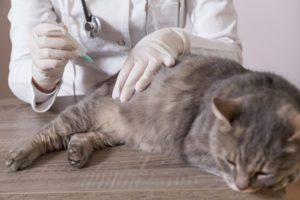Symptoms of Rabies in Cats
Rabies is a terrifying disease for many people. After all, it is a life-threatening disease that can be passed to humans and pets from other infected animals. Here we will be explaining what the symptoms of rabies are in domestic cats.
Early on the only symptoms of rabies in cats will be fever, lethargy, and a reduced appetite. However, these symptoms quickly progress into more severe signs like seizures, paralysis, and dramatic behavioral changes.
In addition to describing the symptoms of rabies in domestic cats, we will also be explaining how rabies is diagnosed, prevented, and spread. We will also be answering some other commonly asked questions about rabies in cats. Let’s get into it.

What Is Rabies?
Rabies is a viral disease that can be passed from one mammal to another. This includes all species of mammals, including humans. Unfortunately, rabies is always a fatal condition. This is why preventing rabies through vaccination is so important in our pets.
Rabies mainly affects an animal’s nervous system. This is why symptoms like seizures, paralysis, and extreme behavioral changes are so prevalent in this disease.
How Is Rabies Spread
Rabies is spread from one mammal to another through scratches and bites. Most of the time a cat will get rabies from getting into a fight with another infected animal. This means that outdoor cats are at much more risk of contracting rabies than indoor cats are.
Early Symptoms Of Rabies In Cats

The early symptoms of rabies in cats are not very obvious. As a result, many cat owners may miss these symptoms or misinterpret them for another condition or disease. Here are the early signs of rabies in cats that occur in just the first few days of infection.
Fever
A fever usually means that a cat has some kind of illness. A fever for a cat is a temperature that is above 103 degrees Fahrenheit.
Lethargy
Lethargy means that a cat seems to be more lazy and tired than usual. This is a very common symptom of illness or medical conditions in cats.
A Reduced Appetite
A reduced appetite is also a very common sign that something is wrong with a cat. Although this symptom does not necessarily mean that a cat has rabies, you should still get them checked out by a vet if they are not eating.
Progressing Symptoms of Rabies In Cats
The early, minor symptoms of rabies in cats will progress quickly. Unlike the early symptoms of rabies, the progressing symptoms are difficult to miss. These symptoms are also much more rare in common cat diseases, and they are usually a telling sign that a cat in fact does have rabies. Here are the symptoms of progressing rabies infection in cats.
Seizures
Rabies attacks a mammal’s nervous system. As a result, seizures are a fairly common symptom of rabies infection in cats.
Paralysis
The nature of rabies also leads to paralysis. This may start with partial paralysis of the legs, mouth, and throat. This inability to swallow is what causes the excessive drooling or foaming at the mouth that rabies is known for. This paralysis will likely progress quickly, and this is what ultimately kills a rabid animal.
Behavioral Changes
Behavioral changes can also occur in rabid cats. Most of the time, these behavioral changes either present themselves as a sudden depression or a sudden onset of aggressive behavior. Although behavioral changes do not necessarily appear in every rabies case, they are a hallmark sign of a rabies infection when it does occur.
Advanced Stage Symptoms Of Rabies In Cats 
There are two advanced stages of a rabies infection in cats. They are the furious phase and the paralytic phase. Here we will be describing these advanced stages of rabies in cats more thoroughly.
The Furious Phase
The furious phase refers to the sudden onset of aggressive behavior that some rabid cats develop. Although not every cat with rabies will enter the furious phase, it is a fairly common occurrence. Usually, this aggressive behavior will progressively get worse as the disease progresses.
The Paralytic Phase
Although not every rabid animal will necessarily enter the furious phase, they will all enter the paralytic phase at some point. The paralytic phase refers to the paralysis that occurs as rabies progresses. Like other symptoms of advanced rabies infections, the paralysis tends to get worse quickly. This is what eventually will cause death in a rabid animal.
Rabies in Cats: Frequently Asked Questions
If you are a cat owner, you likely have questions regarding rabies and your feline companion. Here, we’ve answered some frequently asked questions.
1) Can Rabies In Cats Be Cured?
No, rabies in cats cannot be cured. Once a cat has contracted rabies, there is not much that can be done for them.
2) What is the Rabies Prognosis In Cats?
Most cats with rabies will pass away after just 7 to 10 days of having the disease. Symptoms usually progress quickly from mild symptoms to much more severe ones after just two to four days.
3) How Common Is Rabies In Domestic Cats?
Rabies infection in domestic pet cats is not extremely common. This is mainly thanks to most responsible cat owners keeping their cats up to date on their rabies vaccines.
4) Can Rabies In Cats Be Prevented?

Yes, rabies in cats can easily be prevented. The rabies vaccine is considered to be a core vaccine in both cats and dogs. This means that most pet facilities like groomers and boarding facilities will require an up-to-date rabies shot before your pet can be seen.
Cats can receive their first booster shot at 12 weeks old. From there, the cat will need a rabies booster shot around one year later. After this first booster shot, most cats will need to receive more rabies booster shots every three years.
Conclusion
Although not incredibly common, rabies in cats is an extreme condition with a deadly prognosis. This is why it’s important to keep your cat up to date on the rabies vaccine. If your cat is not vaccinated, keep them inside and away from other pets and animals until they are properly protected.
If you have any questions about the rabies vaccination in cats, The Village Vets has multiple locations in the Atlanta, GA region to serve you and your cat. Visit us online to find a location near you!
Recent Posts
About The Village Vets
The Village Vets is a network of animal hospitals based in Atlanta, GA and the surrounding area. We offer honest, excellent service to our clients in a comfortable, friendly atmosphere. To learn more about our locations and how we can better serve you and your pet, click the button below.
Share This Post
Recent Posts
About The Village Vets
The Village Vets is a network of animal hospitals based in Atlanta, GA and the surrounding area. We offer honest, excellent service to our clients in a comfortable, friendly atmosphere. To learn more about our locations and how we can better serve you and your pet, click the button below.



